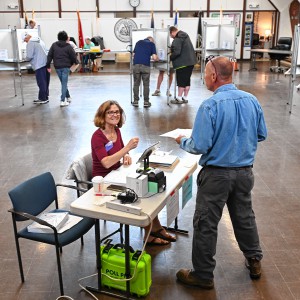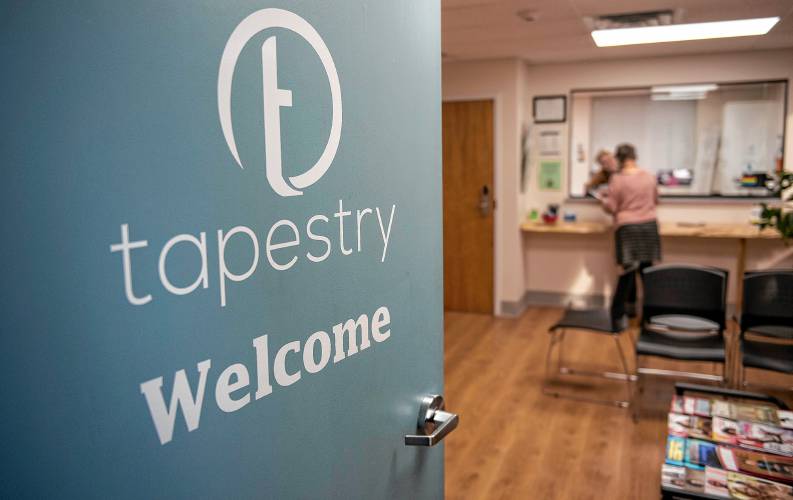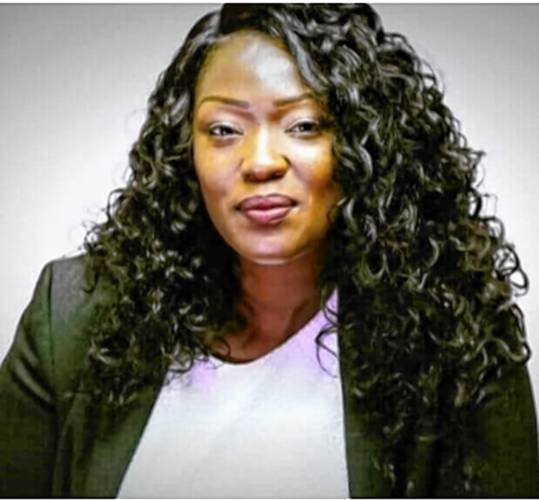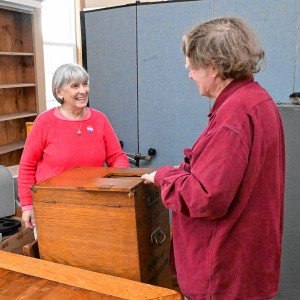New Tapestry Executive Director Mavis Nimoh steps into ‘boots on the ground’ health care
| Published: 10-31-2023 2:24 PM |
SPRINGFIELD — A longtime leader in the public health sector with a commitment to equity and community well-being has taken the helm at Tapestry.
Mavis Nimoh comes to the regional nonprofit health organization from Rhode Island, where she was executive director at the Center for Health and Justice Transformation in Providence.
She said her work there was concerned with the intersection of health and criminal justice systems, and the organization pioneered an approach to treating addiction among prisoners to reduce the serious danger of overdose after they’re released.
“Addiction doesn’t go away because you’re not actively using,” Nimoh said.
The work involved putting scholarship out into the world — “at a think-tank level” — and Nimoh said she found she missed the direct engagement with public health issues she had enjoyed in her earlier work, as leader of the Dauphin County (Pa.) Department of Drug and Alcohol Services.
When she found out about the available executive director position at Tapestry, “it felt like another opportunity in my career journey to effectuate change,” she said.
Founded in 1973, Tapestry and its 120 employees offer sexual and reproductive care, food and nutrition education, and harm reduction services, serving almost 20,000 people a year. Headquartered in Springfield, it also has offices in Northampton, North Adams, Pittsfield, Greenfield and Holyoke.
As a public health organization, Tapestry is like “a rogue element providing services no one else wants to provide,” Nimoh said. She said she sees the way Tapestry approaches care and the services it provides as “revolutionary, important and necessary.”
Article continues after...
Yesterday's Most Read Articles
 Serious barn fire averted due to quick response in Shelburne
Serious barn fire averted due to quick response in Shelburne
 Bridge of Flowers in Shelburne Falls to open on plant sale day, May 11
Bridge of Flowers in Shelburne Falls to open on plant sale day, May 11
 Political newcomer defeats Shores Ness for Deerfield Selectboard seat
Political newcomer defeats Shores Ness for Deerfield Selectboard seat
 Roundup: Pioneer baseball wins Suburban League West title following 2-0 win over Hopkins
Roundup: Pioneer baseball wins Suburban League West title following 2-0 win over Hopkins
 As I See It: Between Israel and Palestine: Which side should we be on, and why?
As I See It: Between Israel and Palestine: Which side should we be on, and why?
 Employee pay, real estate top Erving Town Meeting warrant
Employee pay, real estate top Erving Town Meeting warrant
“Tapestry is boots on the ground, going into the crevices of our community,” she said.
Public health advocates need to communicate to political leaders as well as their funders what’s happening, and how and where dollars should be allocated, Nimoh said, and “Tapestry is uniquely poised to do that.”
Tapestry gets the bulk of its funding from state contracts with agencies such as the Office of HIV/AIDS and the WIC (Women, Infants and Children) program, which it runs in Hampden County. The rest comes from fundraising.
As a nonprofit, “Everything that comes in goes right back out,” Nimoh said.
The organization is also looking to start an endowment fund to secure its survival for another 50 years, she said.
Nimoh succeeds Cheryl Zoll, who stepped down in June after nine years at the organization’s helm. In that time, Tapestry expanded its safe syringe program, introduced gender-affirming hormone care, broadened access to virtual services, and smoothed navigation through the COVID-19 pandemic.
Tapestry board of directors Chair Jeremy Melton had praise for Nimoh.
“Her dedication to social justice, coupled with her extensive background in public health and commitment to harm reduction, makes her the ideal leader for our organization,” Melton said in a statement.
Nimoh said she will tour Tapestry’s offices in the coming weeks and meet the top team in each community.
“Tapestry is working with people with poor outcomes and doing it at low cost,” she said. “That’s health equity.”
James Pentland can be reached at jpentland@gazettenet.com.



 New Salem election ushers in new Selectboard member
New Salem election ushers in new Selectboard member Community Legal Aid expands Disability Benefits Project to Franklin County
Community Legal Aid expands Disability Benefits Project to Franklin County
